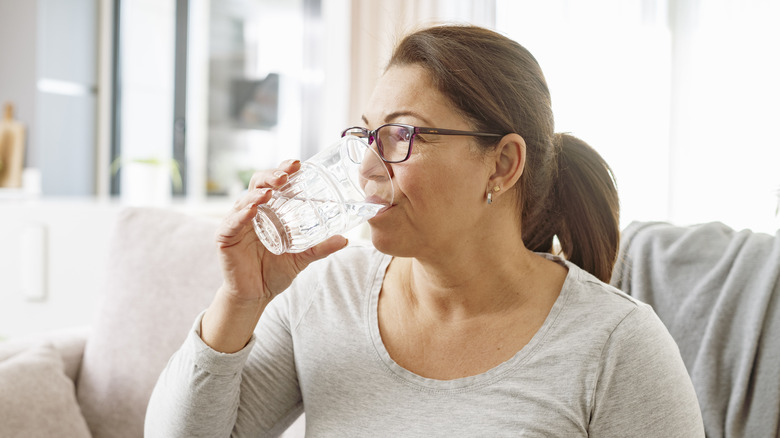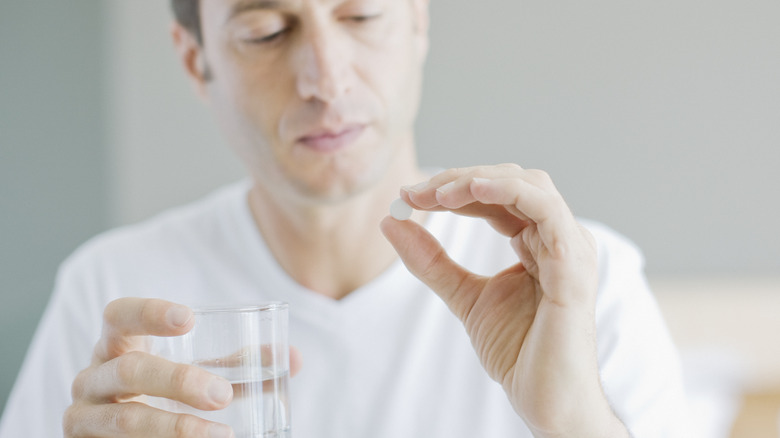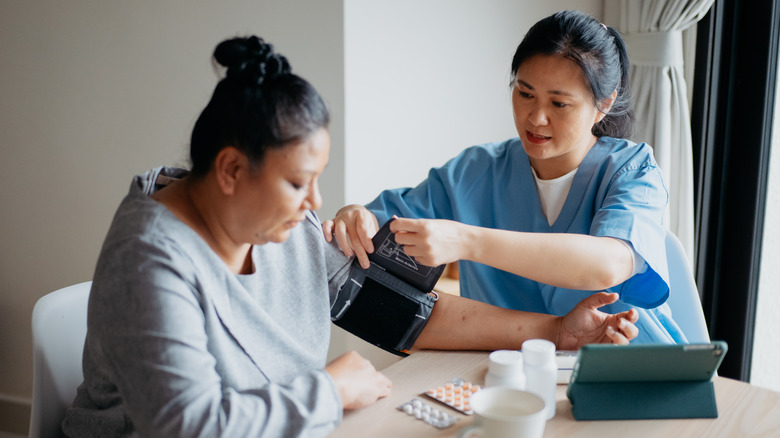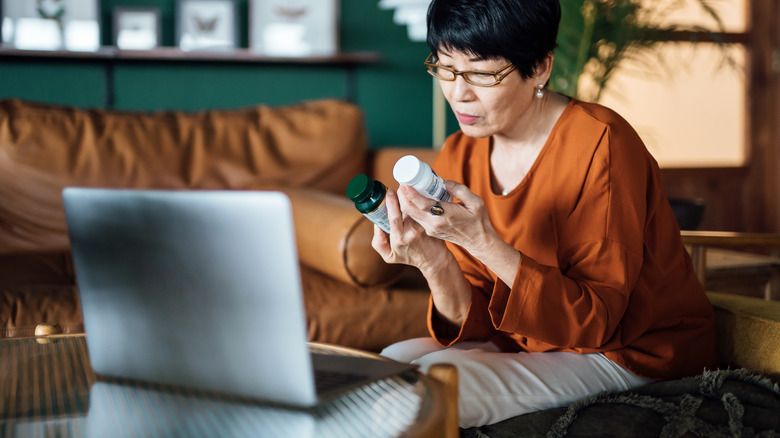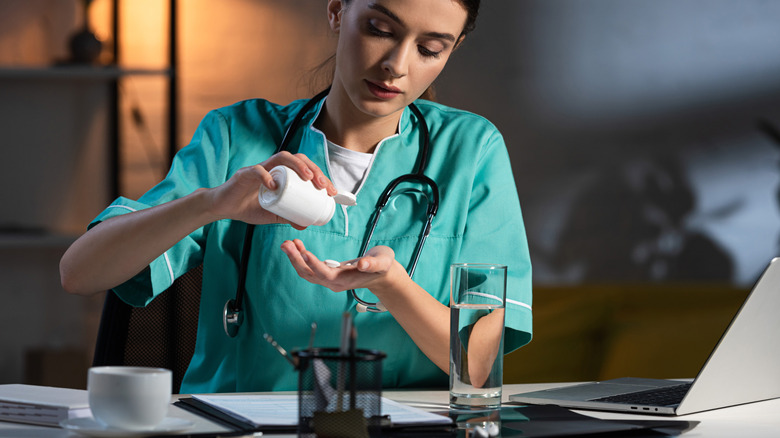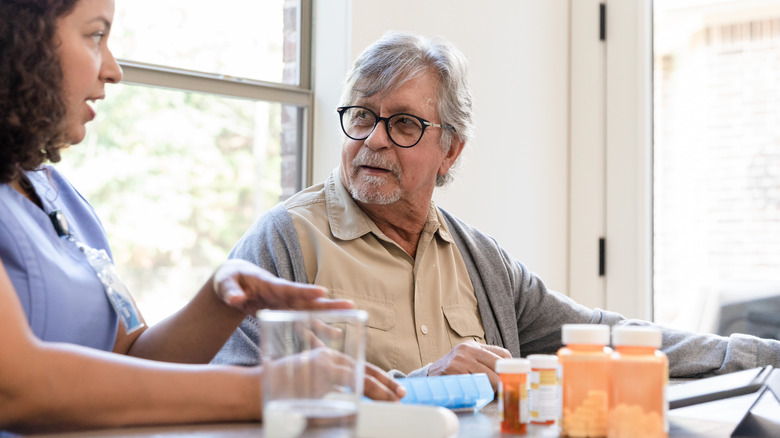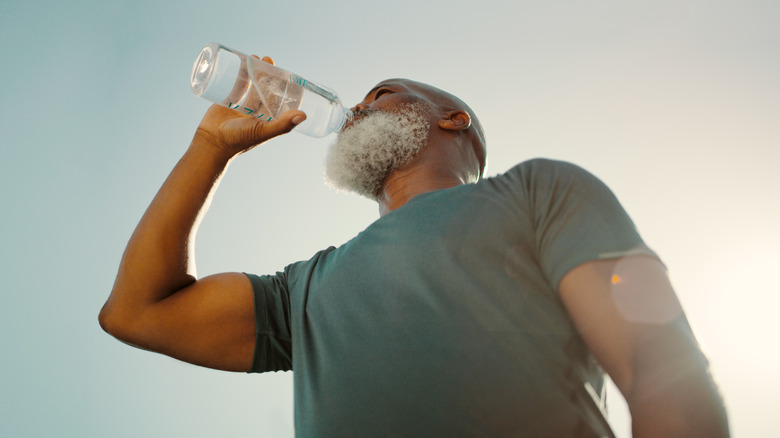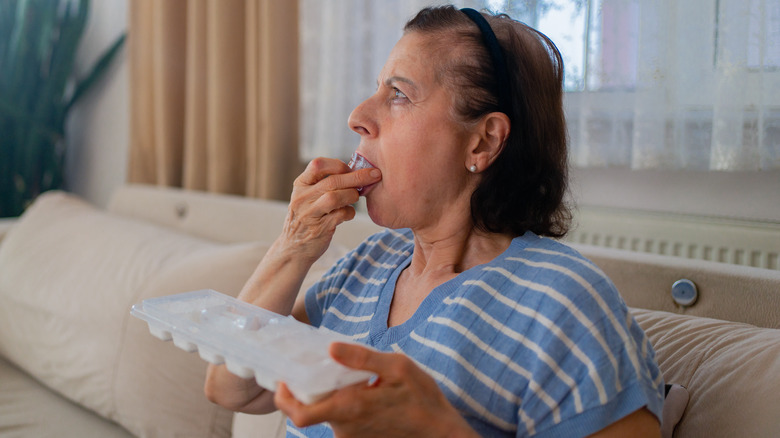Common Medications That Can Make You Thirsty
Thirst is our body's way of letting us know that it needs water. When we do not have enough fluid in the body, our blood volume decreases, which in turn causes a decrease in our blood pressure. The brain can sense when this happens, and in response, it sends out multiple signals throughout the body to conserve fluid and make you want to drink. Research also seems to suggest that the reason why the act of drinking itself seems so satisfying is because our brain releases the hormone dopamine, which is considered a reward signal (via Harvard University).
To emphasize just how important water is in the body, up to 78% of our body is composed of water. The major consequence of not having enough fluid in the body is dehydration. This can happen if you do not consume enough fluids, or if you are losing more than what you replace. Signs and symptoms can range from mild to life-threatening, and include fatigue, headache, dizziness, dry skin, muscle cramps, rapid heartbeat, rapid breathing, and dark-colored pee. If left uncorrected, dehydration can progress to heat strokes, kidney stones, kidney failure, shock, loss of consciousness, or death (per Cleveland Clinic).
Some of the common causes of dehydration include sweating, vomiting, diarrhea, and certain medications. When you become dehydrated, your body starts to crave fluids and make you feel thirsty. Below are some examples of common medications that can cause this to happen.
Water pills
Diuretics, aka "water pills", are a type of medication that quite literally gets rid of water (and salt) in the body. These are mostly given to people who have too much fluid in the body, but dehydration can still occur when the amount of fluid that is lost is significantly greater compared to how much is consumed. Doctors typically prescribe diuretics to people who have edema (swelling that typically occurs in the legs), heart failure, high blood pressure, kidney disease, liver disease, and glaucoma (via WebMD).
Examples of diuretics include thiazide diuretics (e.g., hydrochlorothiazide, chlorthalidone), loop diuretics (e.g., furosemide, bumetanide), and potassium-sparing diuretics (e.g., spironolactone, amiloride). They act on different parts of the kidneys, but with a similar end result: increased excretion of salt and water from the body. Because of this, the possible side effects of these medications are pretty much similar to what you experience when you become dehydrated (i.e., fatigue, muscle cramps, dizziness). Some people may also develop an allergic reaction to the medication, and may experience low libido and irregular heart rhythms (via the Texas Heart Institute).
If you are experiencing side effects from diuretics, it is important to let your doctor know. Depending on your reaction to the drug, they may either lower your dose or switch you to a different type of medication, which will largely depend on what condition they are treating. If there are no other alternatives and you are clearly benefiting from treatment with diuretics, your doctor may decide to prescribe additional medications to help with the side effects instead.
Laxatives
Laxatives are substances that help your bowels get rid of stool. They are used to relieve constipation, and come in many different forms, including pills, powders, syrups, enemas, and suppositories. Each type of laxative works differently.
As the Cleveland Clinic explains, bulk-forming laxatives (e.g., Metamucil, Citrucel) are fiber-containing supplements that add volume to your stool, which helps stimulate your bowel to push it out of your body. Osmotic laxatives (e.g., Miralax, Colace) attract water present in the body and redirect it to your gut, making your stool softer and easier to pass. Lubricant laxatives (e.g., mineral oil) coat the inside lining of your large intestine, creating a slippery environment for stool to pass. Stimulant laxatives (e.g., senna, Dulcolax) stimulate the nerves in your bowel, forcing it to move and propel stool out of the body. Most of these laxatives can be bought over-the-counter, but there are also some prescription laxatives such as lactulose, linaclotide, and prucalopride.
Because laxatives promote stool evacuation, common side effects include excess gas, abdominal cramps, nausea, bloating, and dehydration. Sometimes, it may even cause diarrhea. It is also not uncommon for people to misuse laxatives as a way to lose weight. Doing so can not only increase a person's risk of dehydration, but also electrolyte imbalances, internal organ damage, and laxative dependency. To prevent this, it is best to try natural means of relieving constipation first before taking laxatives, which includes drinking more water, eating more soluble fiber, and exercising regularly (per Medical News Today).
Certain blood pressure medications
According to the Centers for Disease Control and Prevention (CDC), close to half of adults in the United States have hypertension, but less than a quarter have their disease under control. Two of the most common blood pressure medications prescribed are called angiotensin-converting enzyme (ACE) inhibitors and angiotensin II receptor blockers (ARBs). ACE inhibitors and ARBs work similarly in the sense that they both relax blood vessels to help alleviate blood pressure. The only difference is that they exert their effects on different parts of the main pathway that controls blood pressure. Because of this effect, ACE inhibitors and ARBs are associated with side effects related to water and electrolyte balance in the body, such as low blood pressure, dizziness, dry mouth, and kidney problems (per GoodRx Health). Examples of ACE inhibitors include lisinopril, benazepril, and enalapril; meanwhile, ARBs include losartan, telmisartan, and valsartan.
Although ACE inhibitors and ARBs are widely used in the treatment of high blood pressure, there are certain people who should not take them. These include pregnant women, those who are allergic to ACE inhibitors or ARBs, and people who have angioedema (swelling), kidney disease, aortic valve stenosis, and low blood volume.
If you are taking an ACE inhibitor or ARB and are not reacting well to it, speak with your doctor about possible alternatives, such as beta blockers (e.g., atenolol, carvedilol) or calcium channel blockers (e.g., amlodipine, nifedipine). Diuretics can also be used to lower blood pressure, but this is not a good alternative if you are already experiencing dehydration with ACE inhibitors or ARBs.
Some oral diabetes medications
Diabetes was the eighth leading cause of death in the U.S. in 2019. According to the CDC, over 37 million Americans have diabetes (both diagnosed and undiagnosed), and more than 96 million American adults have prediabetes. As great as it is that we now have many treatment options for one of the most common chronic conditions in the world, diabetes mellitus medications are not without their side effects.
Drug therapy for diabetes mellitus comes in many forms. There are oral tablets, inhaled powders, and injectables. They all work differently from one another, with the same end goal of maintaining normal blood sugar levels. One of the most common side effects of diabetes drugs is gastrointestinal upset. This can manifest as abdominal pain, nausea, vomiting, and/or diarrhea. Too much vomiting or diarrhea can lead to dehydration, which can consequently make you feel thirsty (via WebMD). Examples of diabetes medications that can cause these side effects include metformin, pioglitazone (Actos), acarbose, SGLT2 inhibitors (e.g., Jardiance, Farxiga), GLP-1 agonists (e.g., Ozempic, Trulicity), and dual GIP/GLP-1 receptor agonists (e.g., Mounjaro).
If you were prescribed medication for diabetes that you are not able to tolerate, speak with your doctor so that they can find alternatives that will work best for you. According to GoodRx Health, other ways you can help maintain normal sugar levels in addition to medications include proper diet control, regular physical activity, maintaining a healthy weight, decreasing stress, and getting enough sleep.
Chemotherapeutic agents
Chemotherapy is one of the main treatment options for cancer. Per the American Cancer Society, it involves administration of drugs that target the cells in the body to prevent them from multiplying. There are several drugs that are used in chemotherapy, and these include alkylating agents (e.g., cyclophosphamide, busulfan, lomustine), antimetabolites (e.g., 5-FU, methotrexate, hydroxyurea), antitumor antibiotics (e.g., doxorubicin, bleomycin, dactinomycin), corticosteroids (e.g., prednisone, dexamethasone), mitotic inhibitors (e.g., paclitaxel, vincristine), and topoisomerase inhibitors (e.g., etoposide, topotecan, teniposide). Surprisingly, cancer is not the only disease that chemotherapeutic drugs can treat. Some are also used in the treatment of blood disorders like sickle cell anemia, as well as autoimmune conditions like lupus and rheumatoid arthritis (via Healthline).
Chemotherapeutic agents can cause a wide variety of side effects. Among these are vomiting, diarrhea, increase in urination, and fever. These can all indirectly lead to dehydration and make you feel thirsty. According to ChemoCare, because dehydration is a common problem that occurs following chemotherapy, it is crucial to take proactive steps to prevent this from happening in the first place. Recognizing the signs and symptoms is the first step. Having a plan to ensure that you are staying adequately hydrated is the next. Your doctor may also prescribe certain medications to alleviate symptoms of nausea, vomiting, and diarrhea. If these do not work, speak with your doctor for other possible treatment alternatives.
Caffeine-containing drugs and other stimulants
Per MedlinePlus, caffeine is a substance that can be acquired naturally from plants (e.g., coffee beans, tea leaves, cacao pods) or developed synthetically in a lab and added to certain medications and commercial products. It is a stimulant that helps give you an extra boost of energy and keep you awake, but it also acts as a diuretic (just like water pills) and removes excess salt and water from the body. Because of this, caffeine can make you urinate a lot more than usual, and if you do not adequately replace the fluid that you lose, you may feel thirsty and eventually become dehydrated. Caffeine is also acidic, which increases your risk of developing heartburn or stomach issues, especially if you consume a lot of it.
Ironically, even though caffeine acts like a diuretic (which can help lower blood pressure), Harvard Health states that drinking coffee can actually increase your blood pressure, especially in the case of people who are not regular coffee drinkers. It is suggested, however, that the explanation behind this is not the caffeine itself, but other ingredients that can be found in coffee.
It is almost impossible to tell a regular coffee drinker to stop drinking coffee, but if you drink or take caffeine for the purpose of staying alert, there are other ways you can accomplish this without the help of caffeine. The Cleveland Clinic suggests drinking a glass of water first thing in the morning, exercising regularly, investing in good quality sleep, managing your stress, getting adequate sun exposure, and practicing meditation.
Medications with anticholinergic properties
Aside from dehydration, some medications can also cause dry mouth, which may give you a false sensation of thirst. These medications belong to either a group of drugs called anticholinergics or a different class of drug with anticholinergic properties.
Anticholinergic drugs block the neurotransmitter acetylcholine, a substance secreted by nerve cells to send signals throughout the body (via StatPearls). By blocking acetylcholine, anticholinergics are able to relax muscles, block secretions like saliva and sweat, and prevent vomiting. They are used to treat a wide variety of health conditions, such as allergies, asthma, COPD, depression, overactive bladder, Parkinson's, and vomiting. They are also sometimes used during surgery to prevent movement.
Aside from dry mouth, other side effects associated with anticholinergics include blurry vision, headache, rapid heartbeat, flushing, increase in body temperature, urinary retention, and changes in behavior. Examples of common anticholinergics and drugs with anticholinergic properties include atropine, glycopyrrolate, scopolamine, antidepressants (e.g., amitriptyline, paroxetine), antihistamines (e.g., hydroxyzine, diphenhydramine), antipsychotics (e.g., clozapine, haloperidol), antiepileptics (e.g., carbamazepine, oxcarbazepine), muscle relaxants (e.g., baclofen, cyclobenzaprine, tizanidine), opioids (e.g., tramadol, meperidine), antiparkinsonian drugs (e.g., benztropine, amantadine), and medications used to treat GI issues (e.g., loperamide, meclizine, ranitidine, promethazine).
If you are experiencing dry mouth and you think it may be associated with a medication you are taking, speak with your doctor so that they can help you identify which one may be the culprit and help you find a possible alternative.
What you can do to manage and prevent dehydration
The solution to preventing and managing dehydration may seem like it is as simple as drinking more water, but that is not really the case. When you are dehydrated, you are not only deficient in water. Most of the time, you are deficient in electrolytes, too.
Electrolytes include sodium, potassium, calcium, magnesium, chloride, phosphate, and bicarbonate. They play a very important role in fluid balance in the body, and are also integral in several other processes like conduction of nerve signals, muscle contraction, and maintenance of internal pH. Mild imbalances are often tolerated, but when your electrolyte levels become significantly imbalanced, you may experience a wide range of symptoms, like irregular heart rhythm, fast heart rate, muscle cramps, tingling, numbness, weakness, fatigue, headaches, and confusion (per Healthline).
A good rule of thumb when treating dehydration is to replace what you lose. For adults with mild to moderate dehydration, water is usually enough. Sports drinks are a good choice as well. In children, however, it is very important to hydrate using an oral rehydration solution (e.g., Pedialyte). In cases of severe dehydration, the only way to replenish lost fluid promptly is through a vein (via Mayo Clinic).
To prevent dehydration, the Cleveland Clinic suggests that you drink around 91 ounces of water a day if you are female and about 125 ounces if you are male. If you sweat a lot, try to replace what you lose in your sweat by drinking more water. Be aware of any medications you are taking that may make you dehydrated, and try to avoid caffeine, alcohol, and sugar as much as you can.
What you can do to help with dry mouth
Having a dry mouth is not a pleasant feeling. It can also make it difficult for you to eat or even speak. If you are experiencing dry mouth and not dehydration per se, there are several things you can do aside from drinking water to help remedy it.
It can be dangerous to keep drinking large amounts of water, because there is such a thing as overhydration. Instead, sip small amounts of water throughout the day to help moisturize your mouth. You can also keep a spray bottle with water on hand and spray the inside of your mouth as often as you need. Adding a small amount of aloe or glycerin to the water may also help your mouth retain moisture. However, be careful not to put glycerin drops directly on your tongue or in your mouth. Johns Hopkins Medicine suggests using a humidifier, chewing gum, sucking on sugar-free candy or lozenges, eating more liquid food, letting frozen fruit like melon or cucumber slowly melt in your mouth, and using over-the-counter saliva substitutes.
You can also consult your doctor and ask them if there are any medications you can take to help stimulate saliva production. These medications are not appropriate for everyone and may even interact with other medications you are already taking. Per SingleCare, you should also stop smoking and using other tobacco products, since this can further decrease the production of saliva. Most importantly, review your medications with your doctor to see if any of the ones you are taking may explain your dry mouth, and stop taking them if they are not necessary.
